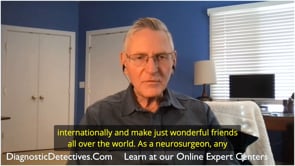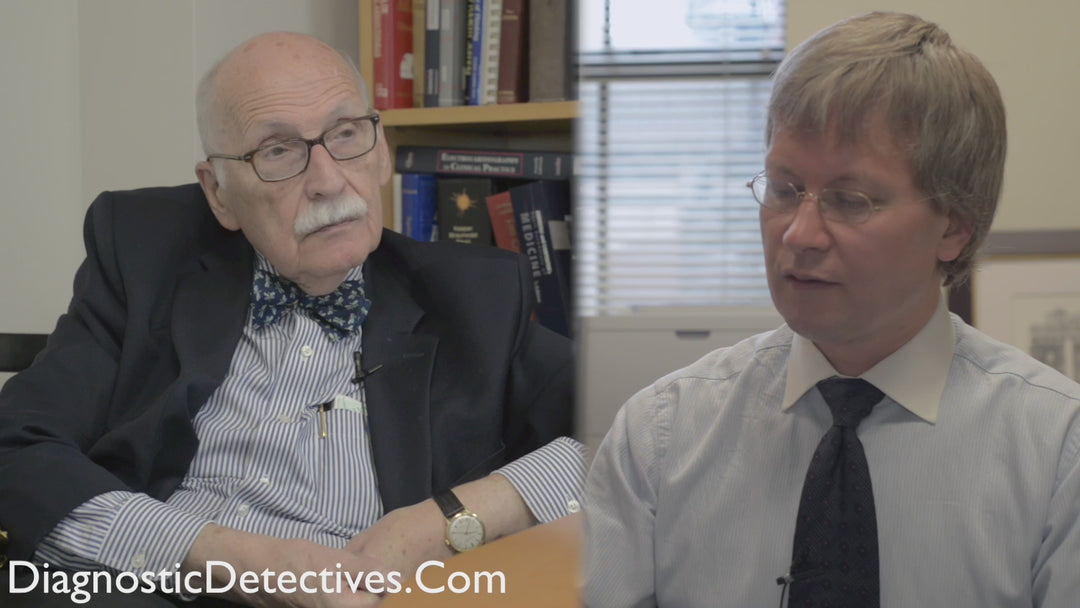Leading expert in clinical trials and medical statistics, Dr. Stephen Evans, MD, explains the critical importance of integrity in medical research. He discusses the difference between proving and finding out in clinical trials. Dr. Stephen Evans, MD, highlights how the COVID-19 pandemic amplified both good and bad human behaviors. He emphasizes the need for consistency between scientific work and personal conduct. The conversation explores the profound societal impacts observed during the global health crisis.
Integrity in Clinical Trials and Pandemic Amplification of Human Behavior
Jump To Section
- Clinical Research Integrity
- Proving vs Finding Out in Medicine
- Pandemic Behavior Amplification
- Integrity in Medical Practice
- Societal Impact of COVID-19
- Full Transcript
Clinical Research Integrity
Dr. Stephen Evans, MD, emphasizes the fundamental importance of integrity in clinical research and medical practice. He draws from his background in physics to highlight critical differences in research approaches. The statistical consultant observes that medical researchers often approach studies with predetermined agendas rather than genuine scientific curiosity.
Dr. Evans identifies a crucial distinction between researchers who want to "find out" if treatments work versus those who want to "prove" their effectiveness. This mindset difference significantly impacts research quality and outcomes. He advocates for maintaining scientific integrity throughout the research process to ensure valid results.
Proving vs Finding Out in Medicine
Dr. Stephen Evans, MD, explains the critical difference between proving and finding out in medical research. He shares his professional preference for collaborating with researchers who genuinely seek knowledge rather than those determined to confirm preconceived notions. This approach ensures more objective and reliable clinical trial outcomes.
The statistical consultant emphasizes that being "wedded to your own idea" can compromise research integrity. Dr. Evans stresses the importance of maintaining critical thinking throughout medical research. He believes this mindset leads to more accurate diagnoses and effective treatments for patients.
Pandemic Behavior Amplification
Dr. Stephen Evans, MD, describes how the COVID-19 pandemic served as a powerful amplifier of human behavior. He observes that the crisis magnified both positive and negative aspects of society. The pandemic revealed extraordinary generosity alongside disturbing greed and misconduct.
Dr. Evans cites specific examples from the UK experience, including an elderly veteran who raised millions for healthcare workers. Conversely, he notes incidents of PPE theft and assaults on medical staff. These contrasting behaviors demonstrate how crises intensify existing societal tendencies.
Integrity in Medical Practice
Dr. Stephen Evans, MD, connects the mathematical concept of integrity with medical ethics and practice. He explains that integrity shares its root meaning with "integer," representing wholeness and completeness. This principle should guide both clinical research and patient care.
The medical statistician emphasizes that healthcare professionals must maintain consistency between their scientific work and personal behavior. Dr. Stephen Evans, MD, notes that even influential figures can fail to uphold integrity standards, as seen during pandemic restrictions. He advocates for continuous self-reflection among medical professionals.
Societal Impact of COVID-19
Dr. Stephen Evans, MD, analyzes the broader societal impacts revealed by the COVID-19 pandemic. He observes how lockdown conditions amplified individual attitudes and behaviors. The crisis exposed both the best and worst aspects of human nature across communities.
Dr. Anton Titov, MD engages with these observations, acknowledging our shared humanity during challenging times. The conversation highlights how the pandemic affected medical research, clinical trials, and healthcare delivery. Both physicians emphasize the importance of maintaining ethical standards during public health emergencies.
Full Transcript
Dr. Anton Titov, MD: Professor Evans, is there a question that I didn't ask but should have asked? Is there anything in your interests or your experience that you'd like to share with our viewers and not necessarily on medicine?
Dr. Stephen Evans, MD: I think the first thing is regarding medicine. Having come from a background of physics, I find that too many medical researchers want to prove something. I would occasionally, as a statistical consultant, have somebody come into my office and say, "I want to find out if this treatment works." And somebody else who comes in who says, "I want to prove this treatment works." My prejudice was that I wanted to work with the person who wanted to find out and not with the person who wanted to prove. There is too much being wedded to your own idea. Ideas in medicine are not being critical enough.
I think the second thing I would want to say is I am a great fan of someone called Henry Cloud, who is a clinical psychologist who wrote on integrity. He wrote a great book on integrity. Integrity has the same root meaning as an integer in mathematics, being whole. I think that we need to ensure that we have integrity in all we do.
We have had problems in the UK with people who are in considerable positions of influence who have thought that the rules do not apply to them in regard to social distancing or not traveling. They are people who know that those are things that they should have done. We need to be aware that each one of us can fail to have integrity. But actually, that should be our target. We should have consistency between what we do in our science and what we do in our behaviors.
The other thing I would finally say is that it seems to me that this pandemic has been an amplifier. It has amplified good, and it has amplified bad. In my view, it has amplified generosity, and it has amplified greed.
We have seen in the UK an old soldier who determined to walk a certain number of times around his garden to raise money for the National Health Service prior to his hundredth birthday. He hoped very much he'd raise 1000 pounds. He has raised many millions. And he has become a national figure such that yesterday it was announced he was being given a knighthood. His goodness inspired so many people.
We also see the people who are going into hospitals and stealing the personal protective equipment of the health service staff. We see them breaking into the stores of PPE equipment. We see the people who are spitting at health care workers, saying, "I've got COVID-19," and spitting at the ambulance.
It seems to me that this pandemic has amplified those things. Many of us who are shut up find that our attitudes and our behaviors are amplified in this. We need to recognize it; none of us is immune, none of us is perfectly good. We need to see where we are amplifying our reactions to other people or our behaviors in ways that are not good. And look to amplify our actions and our generosity in ways that are good.
Dr. Anton Titov, MD: Professor Evans, thank you very much. I think that's very important. And it certainly shows that we're all human beings, and let's hope that we'll be able to be good human beings, responsible human beings, and have, as you said, integrity—from integer—in our daily lives, well beyond this pandemic.
Thank you very much for this most interesting conversation. I hope we'll be able to get back to you as the COVID-19 situation develops and results of major clinical trials become known and analyzed. So to get more of your wisdom and commentary, thank you very much for this most useful conversation, Professor Evans. It's been a pleasure, and I hope you keep well. And I hope that we will be in touch again at one stage. Thank you.






